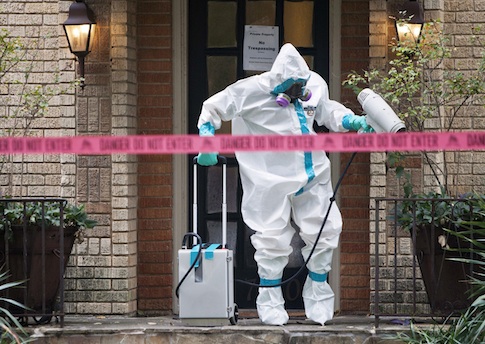By Lisa Maria Garza and Terry Wade
DALLAS (Reuters) - The case of a Dallas nurse who contracted Ebola while caring for a dying Liberian patient shows that the United States needs to rethink how it addresses infection control as an outbreak of the deadly virus spreads beyond West Africa, a top U.S. health official said on Monday.
Dr. Thomas Frieden, director of the U.S. Centers for Disease Control and Prevention, said health authorities are still investigating how the nurse became infected while caring for Thomas Eric Duncan in an isolation ward at Texas Health Presbyterian Hospital.
Duncan died last week and the nurse is the first person to contract the virus on U.S. soil, taking concerns about containing its spread to new heights.
She is "clinically stable," Frieden said, and the CDC is monitoring others involved in Duncan's care in case they show symptoms of the virus.
"We have to rethink the way we address Ebola infection control. Even a single infection is unacceptable," Frieden told reporters. "The care of Ebola is hard. We're working to make it safer and easier."
Frieden also apologized for remarks on Sunday, when the nurse's infection was first disclosed, that suggested she was responsible for a breach in protocols that exposed her to the virus. Some healthcare experts said the comments failed to address deep gaps in training hospital staff to deal with Ebola.
"I'm sorry if that was the impression given," Frieden said. He said the agency would take steps to increase the awareness of Ebola at the nation's hospitals and training for staff.
President Barack Obama was due to meet with senior members of his administration later on Monday to discuss ways to ensure the country's healthcare system was prepared to care for people with the virus, the White House said.
Meanwhile, Louisiana's top law enforcement official said he would file a temporary restraining order to prevent the personal items of Duncan, who died on Wednesday, from being buried in a local landfill, even after being incinerated.
Louisiana Attorney General Buddy Caldwell said material collected from Duncan and the Dallas apartment where he was staying was taken to Port Arthur, Texas on Friday to be processed at the Veolia Environmental Services incinerator. From there the incinerated material would go to a hazardous waste landfill in Louisiana.
"There are too many unknowns at this point, and it is absurd to transport potentially hazardous Ebola waste across state lines," Caldwell said in a statement. According to CDC guidelines, the Ebola virus does not survive on materials that have been incinerated.
The current Ebola outbreak is the worst outbreak on record and has killed more than 4,000 people, mostly in West Africa's Liberia, Sierra Leone and Guinea. Duncan, a Liberian, was exposed to Ebola in his home country and developed the disease while visiting the United States.
The infection of the Dallas nurse is the second known to have occurred outside West Africa since the outbreak that began in March. It follows that of a nurse's aide in Spain who helped treat a missionary from Sierra Leone, who died of the virus.
(Additional reporting by Julie Steenhuysen in Chicago and Jonathan Kaminsky in New Orleans; Editing by Michele Gershberg; Editing by Andrew Hay and Tom Brown)
